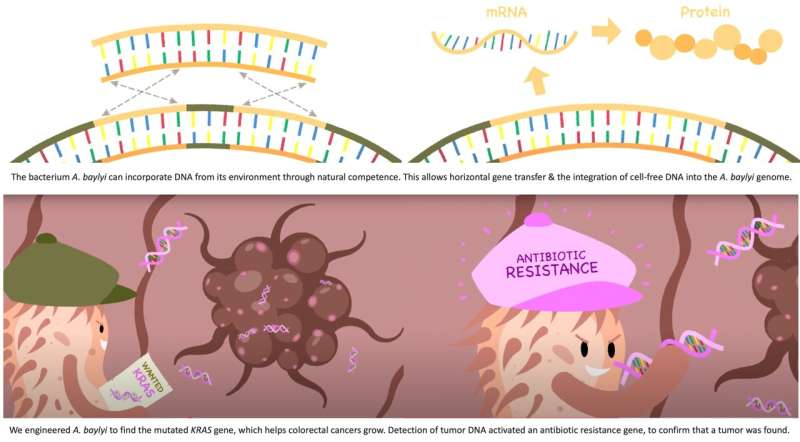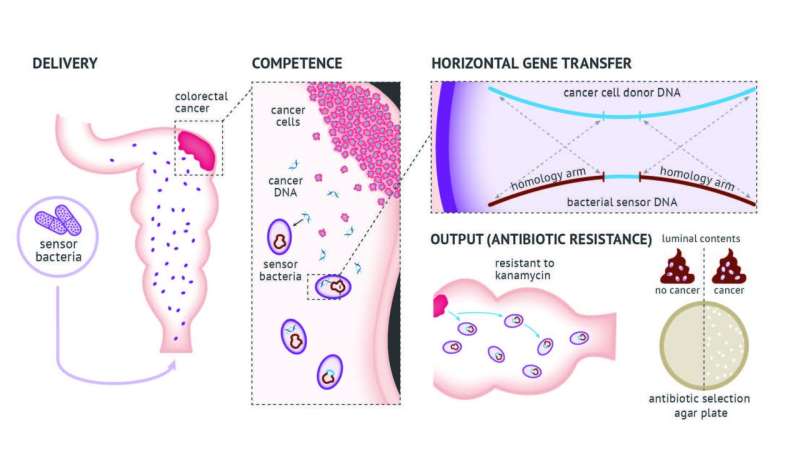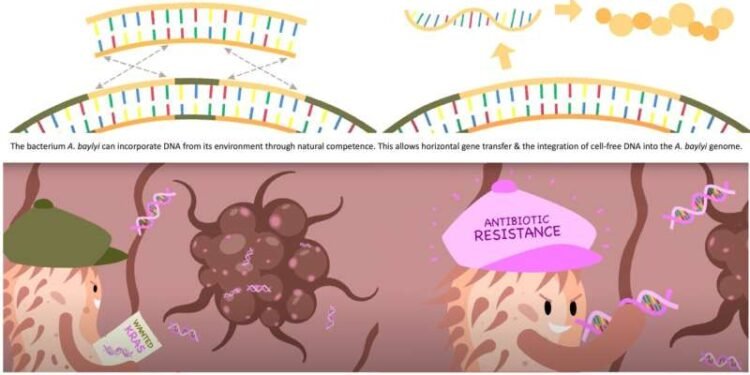
Pushing into a new chapter of technologically advanced biological sensors, scientists from the University of California San Diego and their colleagues in Australia have engineered bacteria that can detect the presence of tumor DNA in a live organism.
Their innovation, which detected cancer in the colons of mice, could pave the way to new biosensors capable of identifying various infections, cancers and other diseases.
The advancement is described in the journal Science. Bacteria previously have been designed to carry out various diagnostic and therapeutic functions, but lacked the ability to identify specific DNA sequences and mutations outside of cells. The new “Cellular Assay for Targeted CRISPR-discriminated Horizontal gene transfer,” or “CATCH,” was designed to do just that.
“As we started on this project four years ago, we weren’t even sure if using bacteria as a sensor for mammalian DNA was even possible,” said scientific team leader Jeff Hasty, a professor in the University of California San Diego School of Biological Sciences and Jacobs School of Engineering. “The detection of gastrointestinal cancers and precancerous lesions is an attractive clinical opportunity to apply this invention.”
Tumors are known to disperse, or shed, their DNA into the environments surrounding them. Many technologies can analyze purified DNA in the lab, but these cannot detect DNA where it is released. Under the CATCH strategy, the researchers engineered bacteria using CRISPR technology to test free-floating DNA sequences on a genomic level and compare those samples with predetermined cancer sequences.
“Many bacteria can take up DNA from their environment, a skill known as natural competence,” said Rob Cooper, the study’s co-first author and a scientist at UC San Diego’s Synthetic Biology Institute. Hasty, Cooper and Australian doctor Dan Worthley collaborated on the idea of natural competence in relation to bacteria and colorectal cancer, the third-leading cause of cancer-related death in the United States.
They began to formulate the possibility of engineering bacteria, which are already prevalent in the colon, as new biosensors that could be deployed inside the gut to detect DNA released from colorectal tumors. They focused on Acinetobacter baylyi, a bacterium in which Cooper identified the elements necessary for both taking up DNA and using CRISPR to analyze it.
“Knowing that cell-free DNA can be mobilized as a signal, or an input, we set out to engineer bacteria that would respond to tumor DNA at the time and place of disease detection,” said Worthley, a gastroenterologist and cancer researcher with the Colonoscopy Clinic in Brisbane, Australia.
Working with Australian colleagues Susan Woods and Josephine Wright, the researchers designed, built and tested Acinetobacter baylyi as a sensor for identifying DNA from KRAS, a gene that is mutated in many cancers. They programmed the bacterium with a CRISPR system designed to discriminate mutant from normal (non-mutated) copies of KRAS. This means that only bacteria that had taken up mutant forms of KRAS, as found in precancerous polyps and cancers, for example, would survive to signal or respond to the disease.
The new research is based on previous ideas related to horizontal gene transfer, a technique used by organisms to move genetic material between one another in a manner distinct from traditional parent-to-offspring genetic inheritance. While horizontal gene transfer is widely known from bacteria to bacteria, the researchers achieved their goal of applying this concept from mammalian tumors and human cells into bacteria.
“It was incredible when I saw the bacteria that had taken up the tumor DNA under the microscope. The mice with tumors grew green bacterial colonies that had acquired the ability to grow on antibiotic plates,” said Wright.
The researchers are now adapting their bacteria biosensor strategy with new circuits and different types of bacteria for detecting and treating human cancers and infections.

“There is so much potential to engineer bacteria to prevent colorectal cancer, a tumor that is immersed in a stream of bacteria, that could help, or hinder, its progression,” said Woods.
Associate Professor Siddhartha Mukherjee of Columbia University, who was not involved in the study, indicated that in the future, “disease will be treated and prevented by cells, not pills. A living bacterium that can detect DNA in the gut is a tremendous opportunity to act as a sentinel to seek and destroy gastrointestinal, and many other, cancers.”
While the new invention requires further development and refinement, the synthetic biology team at UC San Diego continues to optimize the advanced biosensor strategy, said Hasty, who holds affiliations with UC San Diego’s Department of Molecular Biology, Shu Chien-Gene Lay Department of Bioengineering and Synthetic Biology Institute.
“There’s a future where nobody need die of colorectal cancer,” believes Worthley. “We hope that this work will be useful to bioengineers, scientists and, in the future, clinicians, in pursuit of this goal.”
More information:
Robert M. Cooper et al, Engineered bacteria detect tumor DNA, Science (2023). DOI: 10.1126/science.adf3974. www.science.org/doi/10.1126/science.adf3974
Provided by
University of California – San Diego
Citation:
Researchers engineer bacteria that can detect tumor DNA (2023, August 10)
retrieved 10 August 2023
from https://phys.org/news/2023-08-bacteria-tumor-dna.html
This document is subject to copyright. Apart from any fair dealing for the purpose of private study or research, no
part may be reproduced without the written permission. The content is provided for information purposes only.










